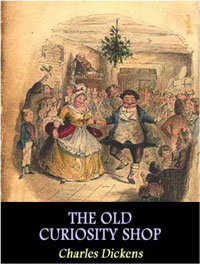July 28, 2020
 The Cocktail Talks from our old pal Charles Dickens’ classic story The Old Curiosity Shop are shading towards the longish (there’s so much good stuff, I don’t want to cull or cut if I can), and as I don’t want to distract, going to keep this intro short. For more about the book, more wonderful quotes about drinks and drinking shops in the delicious Dickens style, more about how I adore Dickens, and just more more more (which you should always want), don’t miss earlier Cocktail Talks from The Old Curiosity Shop: Part I, Part II (from longer ago), and Part III (from recent ago). And don’t miss the below either (or other Dickens Cocktail Talks), where a little mild porter is consumed, and where a window is opened to holler at a beer-boy – I wish I could do that now!
The Cocktail Talks from our old pal Charles Dickens’ classic story The Old Curiosity Shop are shading towards the longish (there’s so much good stuff, I don’t want to cull or cut if I can), and as I don’t want to distract, going to keep this intro short. For more about the book, more wonderful quotes about drinks and drinking shops in the delicious Dickens style, more about how I adore Dickens, and just more more more (which you should always want), don’t miss earlier Cocktail Talks from The Old Curiosity Shop: Part I, Part II (from longer ago), and Part III (from recent ago). And don’t miss the below either (or other Dickens Cocktail Talks), where a little mild porter is consumed, and where a window is opened to holler at a beer-boy – I wish I could do that now!
As a means towards his composure and self-possession, he entered into a more minute examination of the office than he had yet had time to make; looked into the wig-box, the books, and ink-bottle; untied and inspected all the papers; carved a few devices on the table with a sharp blade of Mr. Brass’s penknife; and wrote his name on the inside of the wooden coal-scuttle. Having, as it were, taken formal possession of his clerkship in virtue of these proceedings, he opened the window and leaned negligently out of it until a beer-boy happened to pass, whom he commanded to set down his tray and to serve him with a pint of mild porter, which he drank upon the spot and promptly paid for, with the view of breaking ground for a system of future credit and opening a correspondence tending thereto, without loss of time.
–Charles Dickens, The Old Curiosity Shop
April 10, 2018

Well, pals, we’re at the end of the
Dombey and Son Cocktail Talking (if you’ve missed any of the fun, then don’t miss the miracles that many are beginning to mention as masterful, by which I mean
Part I,
Part II,
Part III), and as I’ve done I believe just once in the past (wanna find out if my belief is correct, read all the past
Charles Dickens Cocktail Talk posts and see), I’m going to put in a Cocktail Talk post that doesn’t contain any cocktails or spirits or bars, even. Instead, it’s a quote about one of my top all-time Dickens characters, Diogenes. Diogenes, or Di, is a dog that’s not friendly to all the folks, but is extremely loyal (like
only dogs can be) and affectionate to a few key characters, including our heroine (and really, central maypole the whole book turns around), Florence. At one point, she has to head out alone into the streets with a whole barrel of emotion and pain, thinking she’s all alone. And then!
Checking her sobs, and drying her swollen eyes, and endeavoring to calm the agitation of her manner, so as to avoid attracting notice, Florence, resolving to keep to the more quiet streets as long as she could, was going on more quietly herself, when a familiar little shadow darted past upon the sunny pavement, stopped short, wheeled about, came close to her, made off again, bounded round and round her, and Diogenes, panting for breath, and yet making the street ring with his glad bark, was at her feet.
‘Oh, Di! oh, dear, true, faithful Di, how did you come here? How could I ever leave you, Di, who would never leave me?’
Florence bent down on the pavement, and laid his rough, old, loving, foolish head against her breast, and they got up together, and went on together; Di more off the ground than on it, endeavoring to kiss his mistress flying, tumbling over and getting up again without the least concern, dashing at big dogs in a jocose defiance of his species, terrifying with touches of his nose young housemaids who were cleaning doorsteps, and continually stopping, in the midst of a thousand extravagances, to look back at Florence, and bark until all the dogs within hearing answered, and all the dogs who could come out, came out to stare at him.
— Charles Dickens, Dombey and Son
September 5, 2017
 Part IV! It’s hard to believe, but our Cocktail Talking through the marvelous Our Mutual Friend, by Mr. Charles Dickens (who is hopefully our mutual friend, as well) is almost at an end. If you’ve missed them, well, starting now don’t miss Part I, Part II, Part III, and the original Our Mutual Friend Cocktail Talk post from way back when, both because you don’t want to miss the Cocktail Talk quotes, and because you’ll get a bit more backstory about the book, and how much I love Dickens – which I know you want to hear about. Heck, you may want to ever read all the Dickens Cocktail Talks. But for the here-and-now, we’re, I believe, setting a record with the fourth Cocktail Talk in a row from the same book (well, outside a series on another Dickens. See if you can find out which one)! Neato! Also, this is going to be the first Cocktail Talk post that doesn’t really have a focus on anything to do with drinks, cocktails, booze, booze-y-ness, spirits, or exceteras. Instead, it’s dogs! Which I love even more. However, there is public house mention, so I believe (and think you’ll agree) that it works.
Part IV! It’s hard to believe, but our Cocktail Talking through the marvelous Our Mutual Friend, by Mr. Charles Dickens (who is hopefully our mutual friend, as well) is almost at an end. If you’ve missed them, well, starting now don’t miss Part I, Part II, Part III, and the original Our Mutual Friend Cocktail Talk post from way back when, both because you don’t want to miss the Cocktail Talk quotes, and because you’ll get a bit more backstory about the book, and how much I love Dickens – which I know you want to hear about. Heck, you may want to ever read all the Dickens Cocktail Talks. But for the here-and-now, we’re, I believe, setting a record with the fourth Cocktail Talk in a row from the same book (well, outside a series on another Dickens. See if you can find out which one)! Neato! Also, this is going to be the first Cocktail Talk post that doesn’t really have a focus on anything to do with drinks, cocktails, booze, booze-y-ness, spirits, or exceteras. Instead, it’s dogs! Which I love even more. However, there is public house mention, so I believe (and think you’ll agree) that it works.
It was a Saturday evening, and at such a time the village dogs, always much more interested in the doings of humanity than in the affairs of their own species, were particularly active. At the general shop, at the butcher’s and at the public-house, they evinced an inquiring spirit never to be satiated. Their especial interest in the public-house would seem to imply some latent rakishness in the canine character; for little was eaten there, and they, having no taste for beer or tobacco (Mrs. Hubbard’s dog is said to have smoked, but proof is wanting), could only have been attracted by sympathy with loose convivial habits. Moreover, a most wretched fiddle played within; a fiddle so unutterably vile, that one lean long-bodied cur, with a better ear than the rest, found himself under compulsion at intervals to go round the corner and howl. Yet, even he returned to the public-house on each occasion with the tenacity of a confirmed drunkard.
–Charles Dickens, Our Mutual Friend
 The Cocktail Talks from our old pal Charles Dickens’ classic story The Old Curiosity Shop are shading towards the longish (there’s so much good stuff, I don’t want to cull or cut if I can), and as I don’t want to distract, going to keep this intro short. For more about the book, more wonderful quotes about drinks and drinking shops in the delicious Dickens style, more about how I adore Dickens, and just more more more (which you should always want), don’t miss earlier Cocktail Talks from The Old Curiosity Shop: Part I, Part II (from longer ago), and Part III (from recent ago). And don’t miss the below either (or other Dickens Cocktail Talks), where a little mild porter is consumed, and where a window is opened to holler at a beer-boy – I wish I could do that now!
The Cocktail Talks from our old pal Charles Dickens’ classic story The Old Curiosity Shop are shading towards the longish (there’s so much good stuff, I don’t want to cull or cut if I can), and as I don’t want to distract, going to keep this intro short. For more about the book, more wonderful quotes about drinks and drinking shops in the delicious Dickens style, more about how I adore Dickens, and just more more more (which you should always want), don’t miss earlier Cocktail Talks from The Old Curiosity Shop: Part I, Part II (from longer ago), and Part III (from recent ago). And don’t miss the below either (or other Dickens Cocktail Talks), where a little mild porter is consumed, and where a window is opened to holler at a beer-boy – I wish I could do that now!




















 Part IV! It’s hard to believe, but our Cocktail Talking through the marvelous
Part IV! It’s hard to believe, but our Cocktail Talking through the marvelous 
